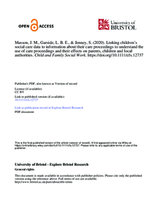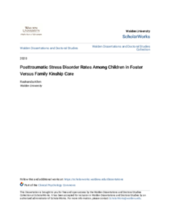Displaying 441 - 450 of 2163
In this article, the authors examine theoretical and legislative conceptualizations of child neglect in terms of their relationship to the disproportionate involvement of Indigenous children in child welfare across Canada and, more specifically, in Quebec.
In this study, the authors drew on qualitative data gathered during in-depth focus groups with 46 high school youth in foster care. The goal of this research was to center and amplify the often-unheard voices of youth in foster care and their experiences in high school.
This study aimed to evaluate the effectiveness of the Fostering Connections program, a newly developed trauma-informed care program within the national child welfare agency in Ireland.
This systematic review of qualitative research aimed to identify and synthesise the findings of relevant studies that documented the experiences of children in care in regard to their school experiences.
In this video, the First Minister of Scotland, Nicola Sturgeon, issues a statement on the publication of the final report of the Scottish Independent Care Review.
This paper explores the potential of data linkage to contribute to understanding interactions between care proceedings and care demand, the examination of changes in practice through the analysis of cohorts of children in the care system, or receiving services, and the provision of feedback to those working in the family justice system on the outcomes of care proceedings for children in the UK.
This systematic review of qualitative research aimed to identify and synthesise the findings of relevant studies that documented the experiences of children in care in regard to their school experiences.
This study uses data from the National Study of Child and Adolescent Well-Being II (NSCAW II) to examine the relationship between separation from siblings in out-of-home care and subsequent offending behavior in adolescence.
This paper reports on an empirical study of child protection services in a local authority where rates of investigations and interventions rose to unprecedented levels during the course of a single year.
The purpose of this study was to address the gap in the literature on the full spectrum of posttraumatic stress disorder (PTSD) attributes and symptoms for children living in nonkinship foster homes versus kinship foster homes, as well as examine the benefits and limitations of children placed in kinship and nonkinship foster homes.


